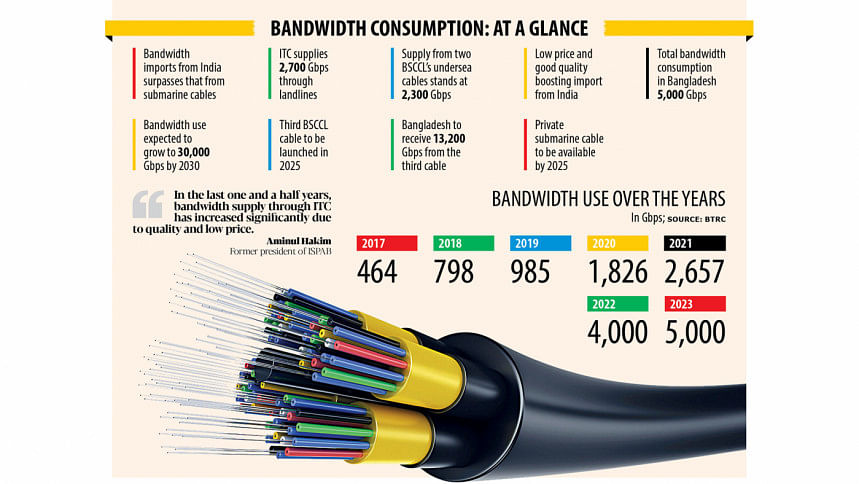Bandwidth import from India surges

Bandwidth imports from India have surpassed that from submarine cables due to a surge in internet usage, India's more attractive pricing and enhanced redundancy, and the saturation of Bangladesh's existing undersea cables' capacity.
Total bandwidth usage now stands at about 5,000 Gbps and more than half of it -- about 2,700 Gbps -- comes through international terrestrial cable (ITC) licences that import bandwidth from India across land borders.
The rest -- about 2,300 Gbps -- is supplied by the Bangladesh Submarine Cable Company Limited (BSCCL), which connects the country with two submarine cables, according to the Bangladesh Telecommunication Regulatory Commission (BTRC).
Before the pandemic, the BSCCL dominated the bandwidth supply with its undersea cables. But the pandemic has pushed up internet usage several fold, leading the ITC operator to bring more bandwidth from India, industry people said.
Total bandwidth use now stands at about 5,000 Gbps and more than half of it -- about 2,700 Gbps -- comes through import from India
The increased bandwidth supply from India was a sigh of relief for Bangladesh as the capacity of the BSCCL, which is around 3,000 Gbps, would not be able to supply the surging demand.
Bangladesh first introduced ITC licences in 2011 to ensure bandwidth availability and redundancy, and to reduce the risk of internet blackouts due to maintenance of undersea cable or natural disasters.
In the last one-and-a-half years, bandwidth supply through ITC has increased significantly due to quality and low price, said Aminul Hakim, former president of the Internet Service Providers Association of Bangladesh.
But from a national interest perspective, bandwidth supply through submarine cables is more suitable. Investment in submarine cables is a one-time expense whereas ITC companies have to pay foreign currency for bandwidth every month.
"So, after establishment of new government and private submarine cables, there is no logic to continue ITC licenses," said Hakim, a director of Metacore Subcom, which teamed up with two other private companies to connect Bangladesh with the first submarine cable to be operated by private entities.
In September last year, the private firms -- Summit Communications, CdNet Communications and Metacore Subcom Ltd -- obtained licences to establish, maintain and operate submarine cables in a development that broke the state monopoly in the wholesale bandwidth business.
The three initially wanted to connect three cables with Bangladesh, but later backtracked from their initial decisions and agreed to collaborate on one connection amid the US dollar shortage.
"We have already signed a deal with an initiative of a Singaporean company and the connection will be complete by 2025," he added.
Moshiur Rahman, chief marketing officer of Fiber@Home Global Limited, a top ITC operator, said data traffic from India has now become essential as tech giants like Google and Facebook started to maintain servers in the country.
"Google and Facebook account for 60 percent of our data traffic and they have undertaken policies to have data centres in India. So, now you can't ignore the Indian market for bandwidth," he added.
Data centres in India have already become one of the most alluring prospects for international investors and prominent developers. Capital is pouring into the data centre sector, giving rise to multiple emerging markets while also witnessing substantial expansion in campus sizes in major cities such as Mumbai and Chennai.
Major global players like Google, Microsoft, and Amazon have initiated the establishment of their data centres in India.
Data centres in India have attracted $10 billion in investments since 2020, driven by increasing demand due to substantial growth in data consumption.
"The hub of the internet is shifting from Singapore to India as the providers plan to bring their content to the eyeball of nearly two billion people," said Md Hasibur Rashid, director and chief marketing officer at Novocom limited.
Currently, in Bangladesh, tech giants including Google, Facebook and Netflix maintain their servers in the facilities of different data centre companies.
"So, Bangladeshi internet providers' cache servers can now sync with the servers of those tech giants, facilitating quality data traffic," he added.
Md Arif Al Islam, managing director of Summit Communications, which supplies the biggest chunk of ITC bandwidth, said Indian bandwidth has multiple redundancy.
Tata Communications Limited and Bharti Airtel have different levels of redundancy and ISPs that use bandwidth from these sources have never experienced internet black out.
Besides, the price of ITC bandwidth is a bit lower, he added.
Sumon Ahmed Sabir, a technology expert, said Bangladesh needs bandwidth from both sources to ensure uninterrupted data traffic.
Mustafa Jabbar, telecom minister, recently said the use of internet bandwidth will shoot up by 600 percent in seven years to 30,000 Gbps as people are ramping up internet use.
Asked about it, he said the education ministry plans to connect educational institutes with the internet as a part of blended education -- integrating online educational materials with physical, location-based classroom techniques.
Asked if Bangladesh would face a bandwidth crunch due to increased usage, he said the capacity increase of existing submarine cables and new government and private cables is enough to supply the necessary bandwidth until 2030.
Bangladesh is a member of the South East Asia-Middle East-Western Europe 4 (SEA-ME-WE 4) consortium, the first undersea cable with which Bangladesh was connected in 2006. It supplies about 800 Gbps bandwidth.
The BSCCL supplies 1,500 Gbps through the SEA-ME-WE 5, for which the connection was established in 2017.
The company is set to receive 13,200 Gbps from the third undersea cable, SEA-ME-WE 6, by 2025.
Also, the BSCCL is going to spend $3.2 million to raise the capacity of its first undersea cable by nearly six times to 4,600 Gbps.
"If a new consortium is built, such as SEA-ME-WE 7 or 8, then we might join it to meet our increasing demand," Jabbar said.

 For all latest news, follow The Daily Star's Google News channel.
For all latest news, follow The Daily Star's Google News channel. 



Comments